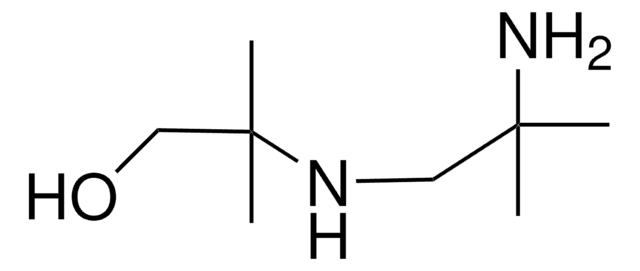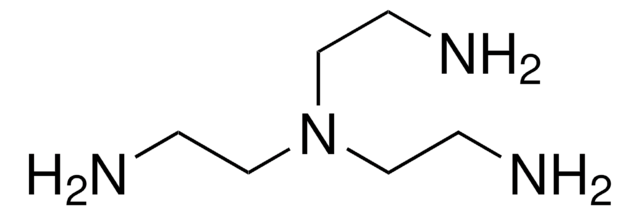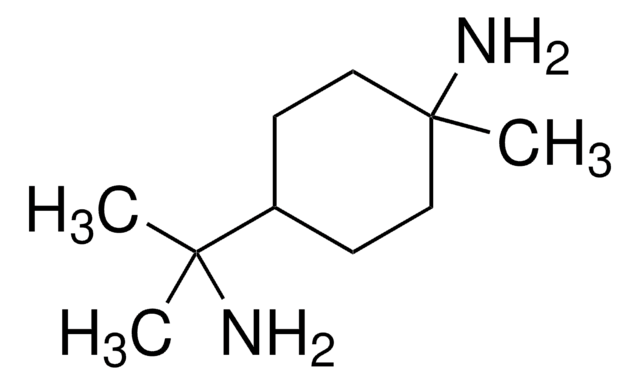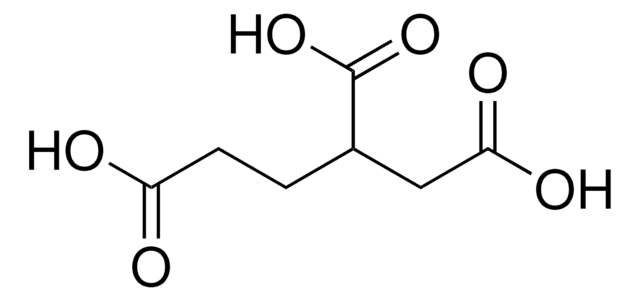All Photos(1)
About This Item
Empirical Formula (Hill Notation):
C4H10N2O2
CAS Number:
Molecular Weight:
118.13
MDL number:
UNSPSC Code:
12352106
PubChem Substance ID:
Recommended Products
form
powder
SMILES string
NCCNCC(O)=O
InChI
1S/C4H10N2O2/c5-1-2-6-3-4(7)8/h6H,1-3,5H2,(H,7,8)
InChI key
PIINGYXNCHTJTF-UHFFFAOYSA-N
Other Notes
Please note that Sigma-Aldrich provides this product to early discovery researchers as part of a collection of unique chemicals. Sigma-Aldrich does not collect analytical data for this product. Buyer assumes responsibility to confirm product identity and/or purity. All sales are final.
NOTWITHSTANDING ANY CONTRARY PROVISION CONTAINED IN SIGMA-ALDRICH′S STANDARD TERMS AND CONDITIONS OF SALE OR AN AGREEMENT BETWEEN SIGMA-ALDRICH AND BUYER, SIGMA-ALDRICH SELLS THIS PRODUCT "AS-IS" AND MAKES NO REPRESENTATION OR WARRANTY WHATSOEVER WITH RESPECT TO THIS PRODUCT, INCLUDING ANY (A) WARRANTY OF MERCHANTABILITY; (B) WARRANTY OF FITNESS FOR A PARTICULAR PURPOSE; OR (C) WARRANTY AGAINST INFRINGEMENT OF INTELLECTUAL PROPERTY RIGHTS OF A THIRD PARTY; WHETHER ARISING BY LAW, COURSE OF DEALING, COURSE OF PERFORMANCE, USAGE OF TRADE OR OTHERWISE.
NOTWITHSTANDING ANY CONTRARY PROVISION CONTAINED IN SIGMA-ALDRICH′S STANDARD TERMS AND CONDITIONS OF SALE OR AN AGREEMENT BETWEEN SIGMA-ALDRICH AND BUYER, SIGMA-ALDRICH SELLS THIS PRODUCT "AS-IS" AND MAKES NO REPRESENTATION OR WARRANTY WHATSOEVER WITH RESPECT TO THIS PRODUCT, INCLUDING ANY (A) WARRANTY OF MERCHANTABILITY; (B) WARRANTY OF FITNESS FOR A PARTICULAR PURPOSE; OR (C) WARRANTY AGAINST INFRINGEMENT OF INTELLECTUAL PROPERTY RIGHTS OF A THIRD PARTY; WHETHER ARISING BY LAW, COURSE OF DEALING, COURSE OF PERFORMANCE, USAGE OF TRADE OR OTHERWISE.
signalword
Warning
hcodes
Hazard Classifications
Eye Irrit. 2
Storage Class
11 - Combustible Solids
wgk_germany
WGK 3
flash_point_f
Not applicable
flash_point_c
Not applicable
Choose from one of the most recent versions:
Certificates of Analysis (COA)
Lot/Batch Number
It looks like we've run into a problem, but you can still download Certificates of Analysis from our Documents section.
If you need assistance, please contact Customer Support.
Already Own This Product?
Find documentation for the products that you have recently purchased in the Document Library.
Sandra Anne Banack et al.
Neurotoxicity research, 33(1), 184-191 (2017-05-06)
β-N-Methylamino-L-alanine (BMAA) is a non-canonical amino acid implicated as a cause for amyotrophic lateral sclerosis/parkinsonism dementia complex and potentially other neurodegenerative diseases. As interest in this molecule has increased, there has been a proliferation of methods along with a plethora
J S Metcalf et al.
Amino acids, 49(8), 1427-1439 (2017-06-18)
Chronic dietary exposure to the cyanobacterial toxin β-N-methylamino-L-alanine (BMAA) triggers neuropathology in non-human primates, providing support for the theory that BMAA causes a fatal neurodegenerative illness among the indigenous Chamorro people of Guam. However, since there are two stereoisomers of
Sung Vo Duy et al.
PloS one, 14(8), e0220698-e0220698 (2019-08-07)
The neurotoxin β-N-methylamino-L-alanine (BMAA), suspected to trigger neurodegenerative diseases, can be produced during cyanobacterial bloom events and subsequently affect ecosystems and water sources. Some of its isomers including β-amino-N-methylalanine (BAMA), N-(2-aminoethyl) glycine (AEG), and 2,4-diaminobutyric acid (DAB) may show different
Zacharias J Smith et al.
Toxins, 12(9) (2020-09-03)
Chautauqua Lake, New York, is a two-basin lake with a deeper, cooler, and less nutrient-rich Northern Basin, and a warmer, shallower, nutrient-replete Southern Basin. The lake is populated by a complex mixture of cyanobacteria, with toxigenic strains that produce microcystins
Daniel G Beach et al.
Analytical and bioanalytical chemistry, 407(28), 8397-8409 (2015-09-24)
The neurotoxin β-N-methylamino-L-alanine (BMAA) has been reported in cyanobacteria and shellfish, raising concerns about widespread human exposure. However, inconsistent results for BMAA analysis have led to controversy. Liquid chromatography-tandem mass spectrometry (LC-MS/MS) is the most appropriate method for analysis of
Our team of scientists has experience in all areas of research including Life Science, Material Science, Chemical Synthesis, Chromatography, Analytical and many others.
Contact Technical Service

![4-[(3-aminopropyl)amino]-4-oxobutanoic acid AldrichCPR](/deepweb/assets/sigmaaldrich/product/structures/209/799/796e70c9-d7f0-4443-ba30-e905b78e049d/640/796e70c9-d7f0-4443-ba30-e905b78e049d.png)







